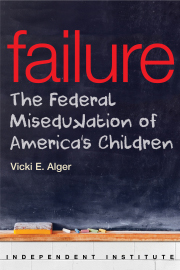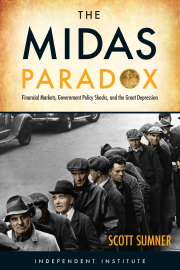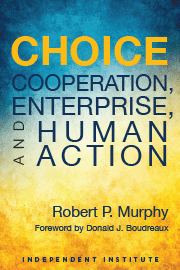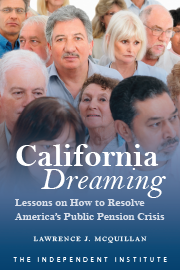Randall Holcombe • Monday, December 4, 2017 •
 It appears the Congress is getting closer to passing a tax reform bill. While there are differences between the current House and Senate versions, they are close enough that it is easy to see that they can be reconciled and tax reform legislation can be passed this year.
It appears the Congress is getting closer to passing a tax reform bill. While there are differences between the current House and Senate versions, they are close enough that it is easy to see that they can be reconciled and tax reform legislation can be passed this year.
Reform on the individual income tax looks like some tinkering with its provisions, not a major reform. The major reform is in the corporate income tax, which would significantly lower rates and provide other benefits.
Alvaro Vargas Llosa • Wednesday, November 29, 2017 •
 The mysteries of science have preserved Lenin alive, whose “death” in 1924 was a cunning scheme. I have managed to track him down to talk about the one hundredth anniversary of the Bolshevik Revolution.
The mysteries of science have preserved Lenin alive, whose “death” in 1924 was a cunning scheme. I have managed to track him down to talk about the one hundredth anniversary of the Bolshevik Revolution.
Me: What does the “October Revolution” say to us today?
Lenin: The vanquished were right. History has sent the Provisional Government to the dustbin of history as well as Kerensky, its last boss. But I admit that the best of Russia was in the Provisional Government: liberals and socialists who had fought the Tsar and wanted reforms. There were even some lucid Mensheviks. If liberals like Prince Lvov, moderate social revolutionaries like Kerensky or Mensheviks like Tsereteli, who were in favor of a Constituent Assembly and moderate reforms, had triumphed, Russia would be different country.
Me: Your country was torn apart and became ungovernable. The Bolsheviks, who were not even a majority in the Russian Social-Democratic Workers Party, destroyed the Provisional Government.
Lenin: Our victory was not the brainchild of my genius or of the mediocrity of our adversaries. It was the result of my fanaticism, both ideological and strategic, and the Great War. The chaos and the commotion enabled us, who knew what we wanted and were prepared to do anything, to become strong. Fanaticism means being willing to do everything, even contradict oneself, to reach the goal.
Vicki Alger • Monday, November 27, 2017 •
 A provision of the recent House GOP tax plan would allow parents to use up to $10,000 of their 529 college savings plans for K-12 expenses including private school tuition. Parental choice in education is a bedrock Republican principle, and President Trump along with Education Secretary Betsy DeVos are leading advocates.
A provision of the recent House GOP tax plan would allow parents to use up to $10,000 of their 529 college savings plans for K-12 expenses including private school tuition. Parental choice in education is a bedrock Republican principle, and President Trump along with Education Secretary Betsy DeVos are leading advocates.
Yet even if the proposed federal K-12 education savings account (ESA) does pass, it may benefit a relative handful of parents, but it likely won’t expand non-public educational choice to parents whose children need it most. Even worse, such help would come at the cost of further expanding the federal government into K-12 education.
Under the proposed change to 529 college savings plans, included in the Tax Cuts and Jobs Act, “higher education expense” is expanded to include up to $10,000 annually for elementary and secondary school tuition expenses, including public, private, and religious schools. Qualified expenses also include costs associated with apprenticeship programs, such as textbooks, supplies, and equipment. (See Section 1202 Consolidation of College Savings Rules, summary pp. 9-10; full bill text, pp. 91-94. See here also.)
This idea isn’t new. In fact, the feds got the idea from the states, which began implementing prepaid college and savings plans more than 30 years ago, starting with Michigan in 1986. A handful of other states had also enacted similar plans by the late 1980s and early 1990s, including Florida in 1987 and Ohio in 1989.
Robert Higgs • Monday, November 27, 2017 •
 What gives some people the right to rule others? At least since John Locke’s time, the most common and seemingly compelling answer has been “the consent of the governed.” When the North American revolutionaries set out to justify their secession from the British Empire, they declared, among other things: “Governments are instituted among Men, deriving their just Powers from the Consent of the Governed.” This sounds good, especially if one doesn’t think about it very hard or very long, but the harder and longer one thinks about it, the more problematic it becomes.
What gives some people the right to rule others? At least since John Locke’s time, the most common and seemingly compelling answer has been “the consent of the governed.” When the North American revolutionaries set out to justify their secession from the British Empire, they declared, among other things: “Governments are instituted among Men, deriving their just Powers from the Consent of the Governed.” This sounds good, especially if one doesn’t think about it very hard or very long, but the harder and longer one thinks about it, the more problematic it becomes.
One question after another comes to mind. Must every person consent? If not, how many must, and what options do those who do not consent have? What form must the consent take—verbal, written, explicit, implicit? If implicit, how is it to be registered? Given that the composition of society is constantly changing, owing to births, deaths, and international migration, how often must the rulers confirm that they retain the consent of the governed? And so on and on. Political legitimacy, it would appear, presents a multitude of difficulties when we move from the realm of theoretical abstraction to that of practical realization.
Sam Staley • Tuesday, November 21, 2017 •
 The Florida Project, a brilliant new film by director/screenwriter Sean Baker (Tangerine, Take Out) explores the precarious world of people living just a few dollars short of homelessness through the ears and eyes of six-year olds. Baker balances adult desperation and childlike optimism, an enigmatic blend that creates a gripping story centering on an important if neglected rung of America’s socioeconomic ladder. It also may well earn The Florida Project a spot on the short list for several categories in the next round of major awards.
The Florida Project, a brilliant new film by director/screenwriter Sean Baker (Tangerine, Take Out) explores the precarious world of people living just a few dollars short of homelessness through the ears and eyes of six-year olds. Baker balances adult desperation and childlike optimism, an enigmatic blend that creates a gripping story centering on an important if neglected rung of America’s socioeconomic ladder. It also may well earn The Florida Project a spot on the short list for several categories in the next round of major awards.
The story opens with six-year old Moonee (Booklyn Prince) sitting with her back against a wall, her feet and legs impatiently unsettled as she waits for something to do. She and her friends live in an extended stay hotel near Disney World, and they have free reign as their parents either work at low-wage jobs, watch cable, or simply fail to keep up with their comings and goings. Like all six-year olds, they don’t do well with inactivity. They will find ways to entertain themselves.
The breadth of this phenomenon is artfully shown by Baker when Moonee gives a “tour” of her hotel to her new friend Jancey (Valeria Cotto) who lives in a similar hotel down the street. Moonee leads her friends into a utility room–after warning them they are never allowed to enter–and proceeds to shut off the electric power to all the rooms in the hotel. As rooms darken and air conditioners shut down in Orlando’s stifling summer heat, virtually every room in the hotel opens, revealing a vast and diverse community of families, couples, singles, and children. Moonee’s story now represents an entire subclass of the economy.
Robert Higgs • Monday, November 20, 2017 •
 For the past few days, several men and a fair-sized tractor front-end loader have been working on the beach road where I live north of Xcalak. None too soon, either, as the potholes have become immense in the past year or so since the last repairs. A gringo neighbor down the road organized this work, hired the men, and arranged for the equipment and several dozen truckloads of fill soil. So what, you are probably thinking.
For the past few days, several men and a fair-sized tractor front-end loader have been working on the beach road where I live north of Xcalak. None too soon, either, as the potholes have become immense in the past year or so since the last repairs. A gringo neighbor down the road organized this work, hired the men, and arranged for the equipment and several dozen truckloads of fill soil. So what, you are probably thinking.
However, you have just read a first-hand report of something regarded as almost impossible in neoclassical welfare economics. We’re talking about muh roads here, amigos—you know, the primary reason why the rubes suppose that we must have government as we know it. In neoclassical economics, such projects as the one now being carried out in front of my house will fall victim to the free-rider problem: because the road construction or maintenance is a so-called public good—a good that if created at all will be equally available to all users—each consumer, it is assumed, will refuse to pay his share of the expenses, and hence no funds will be available for production of the good. Muh roads will be pie in the sky, with nothing at all on earth.
Trouble is, just as in the case of the road repairs now taking place here, countless other public goods are created all the time. People voluntarily pay their pro rata share of the costs without a government gun at their heads. Some people even volunteer their own time and effort to organize and conduct such projects, as my neighbor Wes is doing here. I gladly contributed my 4,000 pesos to this work, and my neighbors contributed similar amounts. Not one of them was forced to pay anything and could have free-ridden had he chosen to do so.
This is the trouble with neoclassical welfare economics, amigos: it’s not a decent theory, but it’s a dandy rationale for government to coerce people right and left ostensibly in order to supply valuable public goods, many of which are mere boondoggles for government contractors and magnets for corruption of the legislators and bureaucrats who impose the projects on an often-unwilling public.
* * *
Robert Higgs is Senior Fellow in Political Economy at the Independent Institute. His most recent book is Taking a Stand: Reflections on Life, Liberty, and the Economy.
Mary Theroux • Friday, November 17, 2017 •
 On this National Women’s Entrepreneurship Day, I hereby declare a counter-movement: one rooted in women who hold themselves in such a manner that any mere man would cower at the thought of treating her as a sexual object.
On this National Women’s Entrepreneurship Day, I hereby declare a counter-movement: one rooted in women who hold themselves in such a manner that any mere man would cower at the thought of treating her as a sexual object.
No, I am not blaming the victims of the numerous accounts now coming to light.
Yes, I am calling for women to claim their dignity.
Yes, I am “privileged”: Both of my grandmothers earned their way while operating in the man’s world of the early- and mid-20th century—one had been a flapper who helped see her family through the Depression on her self-employed earnings, the other was a product of the prairie and early childhood among American Indians, whose culture she admired throughout her life. Thrust into leadership of the business empire my grandfather had founded upon his accidental death when she was 65, she ably managed the existential crisis created by his death, continuing to oversee the businesses’ growing success over the next three decades. My mother was similarly a strong role model, equally at home on corporate and non-profit boards as hands-on Camping Chair of my Girl Scout troop, and the founder at age 60 of a now top-ranked K-12 independent school.
Robert Higgs • Monday, November 13, 2017 •
 They say that a little knowledge is a dangerous thing. About certain things, however, any knowledge at all is dangerous and potentially fatal. One such piece of purported knowledge pertains to the size distribution of income and wealth. This knowledge serves no good purpose; it is wholly unnecessary for defensible government policy or action. It serves only as fuel for economic misunderstanding and demagoguery. It feeds envy and provokes public mischief. If such knowledge were completely unknown, no decent project would be harmed, and a multitude of destructive policies and actions would be rendered more difficult to initiate or carry out.
They say that a little knowledge is a dangerous thing. About certain things, however, any knowledge at all is dangerous and potentially fatal. One such piece of purported knowledge pertains to the size distribution of income and wealth. This knowledge serves no good purpose; it is wholly unnecessary for defensible government policy or action. It serves only as fuel for economic misunderstanding and demagoguery. It feeds envy and provokes public mischief. If such knowledge were completely unknown, no decent project would be harmed, and a multitude of destructive policies and actions would be rendered more difficult to initiate or carry out.
A lesser but still important problem is that all such purported information is subject to high degrees of conceptual and measurement error, as even a moment’s reflection makes plain and a careful study of the matter amply confirms. Yet people bandy about alleged facts about the distribution of income and wealth as if such data were as precise and reliable as measurements of human height and weight.
(For much more extensive discussions of this subject, see my book Against Leviathan: Government Power and a Free Society (2004), especially chapters 1, 3, and 16.)
* * *
Robert Higgs is Senior Fellow in Political Economy at the Independent Institute. His most recent book is Taking a Stand: Reflections on Life, Liberty, and the Economy.
Robert Higgs • Tuesday, November 7, 2017 •
 “Un político pobre es un pobre político” is a well-known Mexican aphorism attributed to Carlos Hank González. My translation: “A politician who is poor is a poor politician.” Bill and Hillary Clinton certainly took that maxim to heart, as have nearly all other politicians who ever got their filthy mitts into the Treasury and their slimy vote into the dispensation of privileges, favors, and subsides for their cronies and key supporters. Corruption should be understood as intrinsic to “American democracy”—a feature, not a bug.
“Un político pobre es un pobre político” is a well-known Mexican aphorism attributed to Carlos Hank González. My translation: “A politician who is poor is a poor politician.” Bill and Hillary Clinton certainly took that maxim to heart, as have nearly all other politicians who ever got their filthy mitts into the Treasury and their slimy vote into the dispensation of privileges, favors, and subsides for their cronies and key supporters. Corruption should be understood as intrinsic to “American democracy”—a feature, not a bug.
Yet the leftists constantly cry out for more government, ostensibly to eliminate the corruption that invariably comes packaged with whatever the government purports to do in the public interest. (Not that the rightists don’t have their own ways of carrying out the same kind of shenanigans, of course.) In truth, the only way to curb political corruption is to drastically reduce the scope of government. Only when the politicians have nothing with which to be corrupt will they stop being corrupt.
* * *
Robert Higgs is Senior Fellow in Political Economy at the Independent Institute. His most recent book is Taking a Stand: Reflections on Life, Liberty, and the Economy.
Sam Staley • Friday, November 3, 2017 •

Marshall, the biopic of the illustrious and path-breaking civil rights attorney Thurgood Marshall, is an important reminder about just how deep-seated racism and prejudice were in American society (and some say still are). Well acted and evenly paced, the film is a worthy addition to a growing list of good films depicting layered aspects of the African-American experience and the fight for justice. (Other moves include Hidden Figures, Loving, Fences, Twelve Years a Slave.)
Some viewers might find the content of Marshall unfamiliar because so much of the contemporary discussion of racism targeting African Americans centers on the South under Jim Crow and slavery. The American Civil War is well over one hundred years old. Jim Crow and its racially segregationist laws were legally dismantled in the 1960s. Most history books give short shrift to the ways racism was institutionalized in social and cultural institutions in northern states. But the entire nation has been struggling with the consequences of both legal (de jure) and de facto racial segregation since colonial courts sanctioned slavery in the 1660s.
Thus, Marshall’s setting, 1941 Greenwich, Connecticut, is important to the story as well as raising awareness of a much neglected part of the twentieth century Civil Rights Movement. The story centers on a now largely forgotten criminal court case, The State of Connecticut vs. Joseph Spellman. Prosecutors charged African-American chauffeur Joseph Spellman (Sterling K. Brown, This is Us, Army Wives) with raping and then attempting to kill wealthy socialite Eleanor Strubing (Kate Hudson, Almost Famous, Nine, Deepwater Horizon). After sixteen hours of interrogation, Spelling confessed to the crime.
 It appears the Congress is getting closer to passing a tax reform bill. While there are differences between the current House and Senate versions, they are close enough that it is easy to see that they can be reconciled and tax reform legislation can be passed this year.
It appears the Congress is getting closer to passing a tax reform bill. While there are differences between the current House and Senate versions, they are close enough that it is easy to see that they can be reconciled and tax reform legislation can be passed this year.























 The mysteries of science have preserved Lenin alive, whose “death” in 1924 was a cunning scheme. I have managed to track him down to talk about the one hundredth anniversary of the Bolshevik Revolution.
The mysteries of science have preserved Lenin alive, whose “death” in 1924 was a cunning scheme. I have managed to track him down to talk about the one hundredth anniversary of the Bolshevik Revolution. A provision of the recent House GOP tax plan would allow parents to use up to $10,000 of their 529 college savings plans for K-12 expenses including private school tuition. Parental choice in education is a bedrock Republican principle, and President Trump along with Education Secretary Betsy DeVos are
A provision of the recent House GOP tax plan would allow parents to use up to $10,000 of their 529 college savings plans for K-12 expenses including private school tuition. Parental choice in education is a bedrock Republican principle, and President Trump along with Education Secretary Betsy DeVos are  What gives some people the right to rule others? At least since John Locke’s time, the most common and seemingly compelling answer has been “the consent of the governed.” When the North American revolutionaries set out to justify their secession from the British Empire, they declared, among other things: “Governments are instituted among Men, deriving their just Powers from the Consent of the Governed.” This sounds good, especially if one doesn’t think about it very hard or very long, but the harder and longer one thinks about it, the more problematic it becomes.
What gives some people the right to rule others? At least since John Locke’s time, the most common and seemingly compelling answer has been “the consent of the governed.” When the North American revolutionaries set out to justify their secession from the British Empire, they declared, among other things: “Governments are instituted among Men, deriving their just Powers from the Consent of the Governed.” This sounds good, especially if one doesn’t think about it very hard or very long, but the harder and longer one thinks about it, the more problematic it becomes.
 For the past few days, several men and a fair-sized tractor front-end loader have been working on the beach road where I live north of Xcalak. None too soon, either, as the potholes have become immense in the past year or so since the last repairs. A gringo neighbor down the road organized this work, hired the men, and arranged for the equipment and several dozen truckloads of fill soil. So what, you are probably thinking.
For the past few days, several men and a fair-sized tractor front-end loader have been working on the beach road where I live north of Xcalak. None too soon, either, as the potholes have become immense in the past year or so since the last repairs. A gringo neighbor down the road organized this work, hired the men, and arranged for the equipment and several dozen truckloads of fill soil. So what, you are probably thinking. On this National Women’s Entrepreneurship Day, I hereby declare a counter-movement: one rooted in women who hold themselves in such a manner that any mere man would cower at the thought of treating her as a sexual object.
On this National Women’s Entrepreneurship Day, I hereby declare a counter-movement: one rooted in women who hold themselves in such a manner that any mere man would cower at the thought of treating her as a sexual object. They say that a little knowledge is a dangerous thing. About certain things, however, any knowledge at all is dangerous and potentially fatal. One such piece of purported knowledge pertains to the size distribution of income and wealth. This knowledge serves no good purpose; it is wholly unnecessary for defensible government policy or action. It serves only as fuel for economic misunderstanding and demagoguery. It feeds envy and provokes public mischief. If such knowledge wer
They say that a little knowledge is a dangerous thing. About certain things, however, any knowledge at all is dangerous and potentially fatal. One such piece of purported knowledge pertains to the size distribution of income and wealth. This knowledge serves no good purpose; it is wholly unnecessary for defensible government policy or action. It serves only as fuel for economic misunderstanding and demagoguery. It feeds envy and provokes public mischief. If such knowledge wer “Un político pobre es un pobre político” is a well-known Mexican aphorism attributed to Carlos Hank González. My translation: “A politician who is poor is a poor politician.” Bill and Hillary Clinton certainly took that maxim to heart, as have nearly all other politicians who ever got their filthy mitts into the Treasury and their slimy vote into the dispensation of privileges, favors, and subsides for their cronies and key supporters. Corruption should be understood as intrinsic to “American democracy”—a feature, not a bug.
“Un político pobre es un pobre político” is a well-known Mexican aphorism attributed to Carlos Hank González. My translation: “A politician who is poor is a poor politician.” Bill and Hillary Clinton certainly took that maxim to heart, as have nearly all other politicians who ever got their filthy mitts into the Treasury and their slimy vote into the dispensation of privileges, favors, and subsides for their cronies and key supporters. Corruption should be understood as intrinsic to “American democracy”—a feature, not a bug.